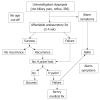Gastroenterology in developing countries: issues and advances
- PMID: 19533805
- PMCID: PMC2699001
- DOI: 10.3748/wjg.15.2839
Gastroenterology in developing countries: issues and advances
Abstract
Developing countries shoulder a considerable burden of gastroenterological disease. Infectious diseases in particular cause enormous morbidity and mortality. Diseases which afflict both western and developing countries are often seen in more florid forms in poorer countries. Innovative techniques continuously improve and update gastroenterological practice. However, advances in diagnosis and treatment which are commonplace in the West, have yet to reach many developing countries. Clinical guidelines, based on these advances and collated in resource-rich environments, lose their relevance outside these settings. In this two-part review, we first highlight the global burden of gastroenterological disease in three major areas: diarrhoeal diseases, hepatitis B, and Helicobacter pylori. Recent progress in their management is explored, with consideration of future solutions. The second part of the review focuses on the delivery of clinical services in developing countries. Inadequate numbers of healthcare workers hamper efforts to combat gastroenterological disease. Reasons for this shortage are examined, along with possibilities for increased specialist training. Endoscopy services, the mainstay of gastroenterology in the West, are in their infancy in many developing countries. The challenges faced by those setting up a service are illustrated by the example of a Nigerian endoscopy unit. Finally, we highlight the limited scope of many clinical guidelines produced in western countries. Guidelines which take account of resource limitations in the form of "cascades" are advocated in order to make these guidelines truly global. Recognition of the different working conditions facing practitioners worldwide is an important step towards narrowing the gap between gastroenterology in rich and poor countries.
Figures








Similar articles
-
Tuberculosis.In: Holmes KK, Bertozzi S, Bloom BR, Jha P, editors. Major Infectious Diseases. 3rd edition. Washington (DC): The International Bank for Reconstruction and Development / The World Bank; 2017 Nov 3. Chapter 11. In: Holmes KK, Bertozzi S, Bloom BR, Jha P, editors. Major Infectious Diseases. 3rd edition. Washington (DC): The International Bank for Reconstruction and Development / The World Bank; 2017 Nov 3. Chapter 11. PMID: 30212088 Free Books & Documents. Review.
-
Accelerating the elimination of viral hepatitis: a Lancet Gastroenterology & Hepatology Commission.Lancet Gastroenterol Hepatol. 2019 Feb;4(2):135-184. doi: 10.1016/S2468-1253(18)30270-X. Lancet Gastroenterol Hepatol. 2019. PMID: 30647010 Review.
-
Working party report of the Gastroenterological Society of Singapore. Part II--Helicobacter pylori and non-ulcer dyspepsia in Singapore.Singapore Med J. 1996 Aug;37(4):428-9. Singapore Med J. 1996. PMID: 8993148
-
[Clinical gastroenterology--luxury or standard of service in gastroenterology?].Z Gastroenterol. 2005 Dec;43(12):1285-92. doi: 10.1055/s-2005-858877. Z Gastroenterol. 2005. PMID: 16315123 German.
-
Gastroenterology training in a resource-limited setting: Zambia, Southern Africa.World J Gastroenterol. 2013 Jul 7;19(25):3996-4000. doi: 10.3748/wjg.v19.i25.3996. World J Gastroenterol. 2013. PMID: 23840144 Free PMC article.
Cited by
-
Sedation practices for routine diagnostic upper gastrointestinal endoscopy in Nigeria.World J Gastrointest Endosc. 2012 Jun 16;4(6):260-5. doi: 10.4253/wjge.v4.i6.260. World J Gastrointest Endosc. 2012. PMID: 22720128 Free PMC article.
-
Helicobacter pylori infection may increase the severity of nonalcoholic fatty liver disease via promoting liver function damage, glycometabolism, lipid metabolism, inflammatory reaction and metabolic syndrome.Eur J Gastroenterol Hepatol. 2020 Jul;32(7):857-866. doi: 10.1097/MEG.0000000000001601. Eur J Gastroenterol Hepatol. 2020. PMID: 31714387 Free PMC article.
-
Lessons Learned From and Future Opportunities for Global Health Endeavors by 2 Academic Gastroenterology Units.Gastroenterology. 2019 Nov;157(5):1177-1179. doi: 10.1053/j.gastro.2019.07.034. Epub 2019 Jul 26. Gastroenterology. 2019. PMID: 31356806 Free PMC article. No abstract available.
-
The Prognostic Values of Neutrophil-to-lymphocyte Ratio and Platelet-to-Lymphocyte Ratio at Baseline in Predicting the In-hospital Mortality in Black African Patients with Advanced Hepatocellular Carcinoma in Palliative Treatment: A Comparative Cohort Study.Hepat Med. 2021 Dec 8;13:123-134. doi: 10.2147/HMER.S333980. eCollection 2021. Hepat Med. 2021. PMID: 34938131 Free PMC article.
-
Evolution of gastroenterology training.World J Gastroenterol. 2009 Apr 21;15(15):1793-8. doi: 10.3748/wjg.15.1793. World J Gastroenterol. 2009. PMID: 19370773 Free PMC article.
References
-
- Ferreira FH, Ravallion M. Global Poverty and Inequality: A review of the evidence. Policy research working paper for the World Bank. Washington: World Bank; 2008.
-
- World Health Organization. World Health Organization Statistical Information System (WHOSIS). Accessed August 4, 2008. Available from: URL: http://www.who.int/whosis/en/
-
- International Monetary Fund Statistical Database. Accessed August 5, 2008. Available from: URL: http://www.imfstatistics.org/imf/
-
- World Health Organization (WHO) World Health Report 2000 - Health systems: improving performance. Geneva: WHO; 2000. Available from: URL: http://www.who.int/whr/2000/en/
Publication types
MeSH terms
LinkOut - more resources
Full Text Sources
Other Literature Sources
Medical
Miscellaneous

